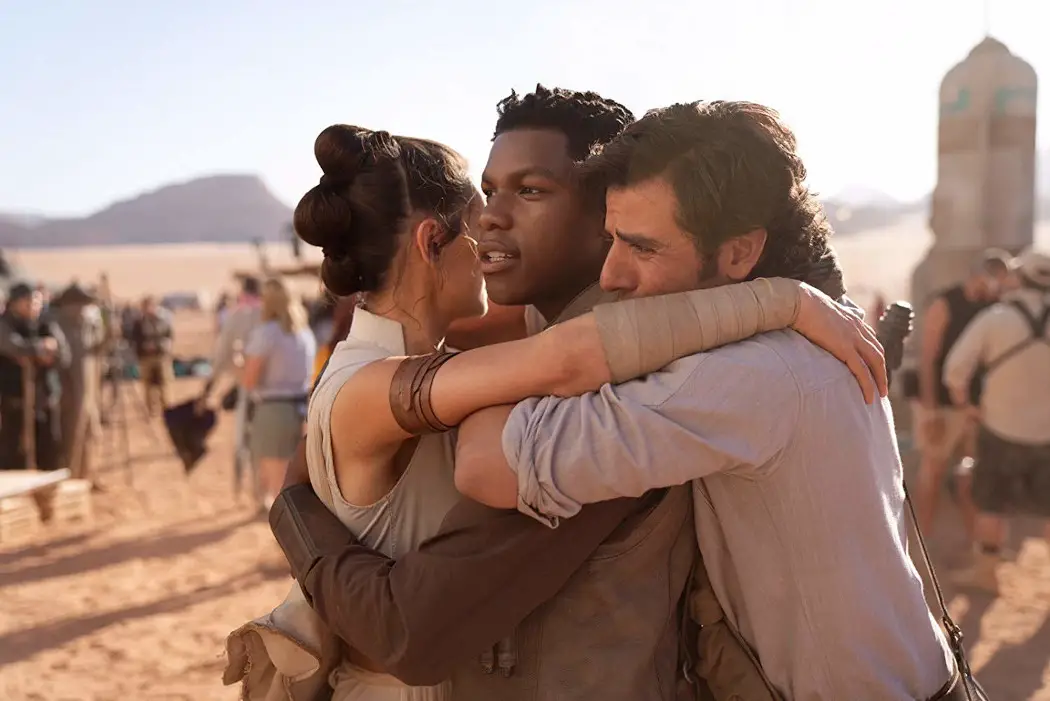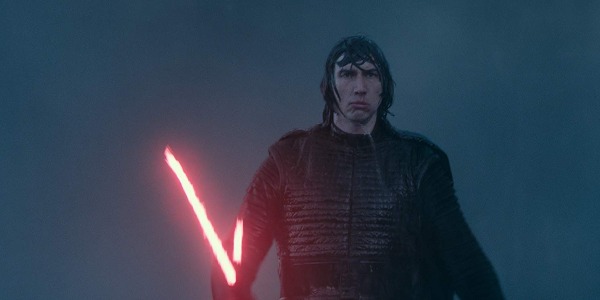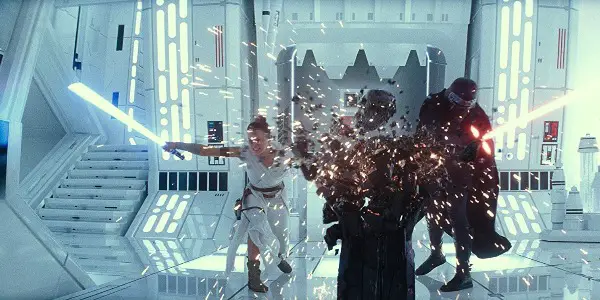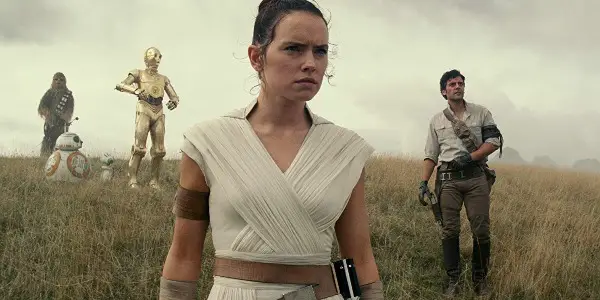STAR WARS: THE RISE OF SKYWALKER: A Largely Disappointing, Occasionally Moving Finale

Holly is a final year film/journalism student currently living in…
“Let the past die. Kill it, if you have to. It’s the only way to become what you were meant to be.”
It’s a statement we’ve heard countless times before, but there’s no denying that Star Wars means so much to so many people. For generations, fans have eagerly awaited new instalments with passion and dedication, finding meaning in a simple story about space battles and mythical wizards created in the 70’s by George Lucas. Like many others, I grew up with the theatrical releases of the prequels and was introduced to the original trilogy by my parents at an early age. The announcement of a sequel trilogy came at a perfect time in my young adult life that had me excited and hopeful for the future.
A Fandom Divided
It’s impossible to discuss Star Wars in 2019 without first acknowledging the fandom behind it. People have always had their own opinions about Star Wars, what it should be, what it represents, and ultimately these conversations have turned from constructive and passionate to downright toxic over recent years.
After Rian Johnson’s The Last Jedi, the fanbase was quite literally divided, and it appeared as though there was no nuance in opinion; you either thought it was the best Star Wars movie ever made, or you wholeheartedly believe Johnson ruined Star Wars (an opinion that was once used against the prequel trilogy).
Quite frankly, the response to the film was embarrassing. Rian Johnson was constantly bombarded with personal attacks and threats of violence on Twitter, fans were petitioning to have Episode 8 remade, and during this time I was almost afraid to admit my status as a Star Wars fan. Whether or not you liked the film (personally, it is in my top 3) Johnson’s vision oozed with creativity, passion, and a determination to create a project within the framework of a domineering company with the hope of bringing something fresh to the saga.

Unfortunately, the same cannot be said for the ninth and final instalment directed by J.J. Abrams, which ultimately serves as a poignant example of the ways artistic integrity and individual creativity are of little importance when compared to pleasing the masses. Even more so, it shows the lack of planning that Lucasfilm and Disney engaged in prior to the release of Episode 7, a deficit that has resulted in three films that feel disjointed and almost unrelated to one another.
A Lack of Vision
When we open on The Rise of Skywalker, Kylo Ren has taken the place of Snoke as Supreme Leader after a failed attempt at recruiting Rey in Episode 8, and the galaxy is now threatened (again) by the late Emperor Palpatine, who has featured in the marketing and promotional material of the film. Right away, it’s clear that you’re expected to be on board, and if you’re not, it’s going to be a rough ride. Without going into spoilers, the reason for his return is mostly unanswered, swept under the rug with vague explanations and messy storytelling, which is the biggest problem with the film: its storytelling.
Filled with MacGuffins, side quests, and plot conveniences that aren’t always explained, the film suffers due to its rushed and overstuffed approach to writing and a perceived need to throw as much at the audience as possible. While it is satisfying to see Rey (Daisy Ridley), Poe (Oscar Isaac) and Finn (John Boyega) take centre stage in many of these adventures, their path is a result of lazy writing that is immediately jarring and just doesn’t feel like Star Wars at times.

Another reason for this is the editing, which cuts so rapidly between plots, characters, and scenes that there doesn’t ever feel like there’s time for investment. This is also the case with the action sequences and set pieces, which occasionally reach the point of absurdity and are missing a sense of tension and uncertainty. Just when John Williams’ timeless score is building to a perfect crescendo and the emotionality of a scene starts to resonate, Abrams cuts away.
At many points, The Rise of Skywalker appears to directly contradict what was set up in Episode 8, even going so far as to make petty jabs at some of the choices Rian Johnson made through the interactions between characters. Themes and relationships established are retroactively altered to suit Abrams’ vision, reveals feel predictable and utterly nonsensical at times, and the challenging ideas and fresh perspective instead become pandering and cheesy.
Filled with ungodly amounts of fan-service and incessant nods to things of the past, it is abundantly clear Abrams is attempting to please the fraction of the fandom that is content to inundate themselves with nostalgia hit after nostalgia hit in the hope of experiencing the child-like wonder they once did. To be honest, it’s concerning.
Not a Total Disappointment
All this isn’t to say that the film is without positives, or that the experience of sitting in a packed theatre for a Star Wars film one last time won’t bring any joy. Despite its problems, it’s frequently entertaining (as long as you don’t question things too much) and, occasionally, moving. As has been the case with the first two films, the highlight of the film are Kylo and Rey and the dynamic which was so beautifully explored in Episode 8.
Though this time around the majority of their scenes together are centred around plot points that feel simultaneously contrived and vague, their chemistry is consistently electric and emotional through some outstanding, vulnerable acting from Daisy Ridley and Adam Driver. Any time they’re on screen together the energy is palpable and real. Adam Driver continues to prove his status as one of the best actors working today, delivering lines that should feel bland in a way that adds depth and resonance, as well as altering his posture and expressions on multiple occasions in a way that is immediately endearing and serves his arc perfectly.

In fact, the acting, chemistry, and comedy ultimately save this film from being completely disappointing. The main trio (Rey, Finn, and Poe) have developed into characters with a believable friendship, with quality banter and back and forth quips that (mostly) land a huge part of their on-screen dynamic. Though it’s disheartening to see that certain characters have been sidelined for this film for seemingly no reason at all, there are some interesting character additions that aren’t altogether wasteful though do feel shoehorned in at times.
The Rise of Skywalker: Conclusion
Ultimately, this is a disappointing film on many fronts, mostly due to some seriously flawed storytelling that should not have been given the green light. It’s hard to describe how I felt leaving the theatre without going into the specifics of spoilers, but the way this nine-film epic wrapped up left me feeling almost hopeless but more than anything, confused.
I adore these characters, and it’s a shame the execution of this one wasn’t treated with more care. It’s hard to predict how this particular instalment will age once the initial shock wears off, but if anything this is a reminder to support independent filmmakers and those willing to challenge the status quo.
May the force be with you.
Does content like this matter to you?
Become a Member and support film journalism. Unlock access to all of Film Inquiry`s great articles. Join a community of like-minded readers who are passionate about cinema - get access to our private members Network, give back to independent filmmakers, and more.
Holly is a final year film/journalism student currently living in Queensland, Australia. She is an all-around movie enthusiast, though currently her favourite directors include Wes Anderson, Martin McDonagh, and Alfonso Cuarón.













